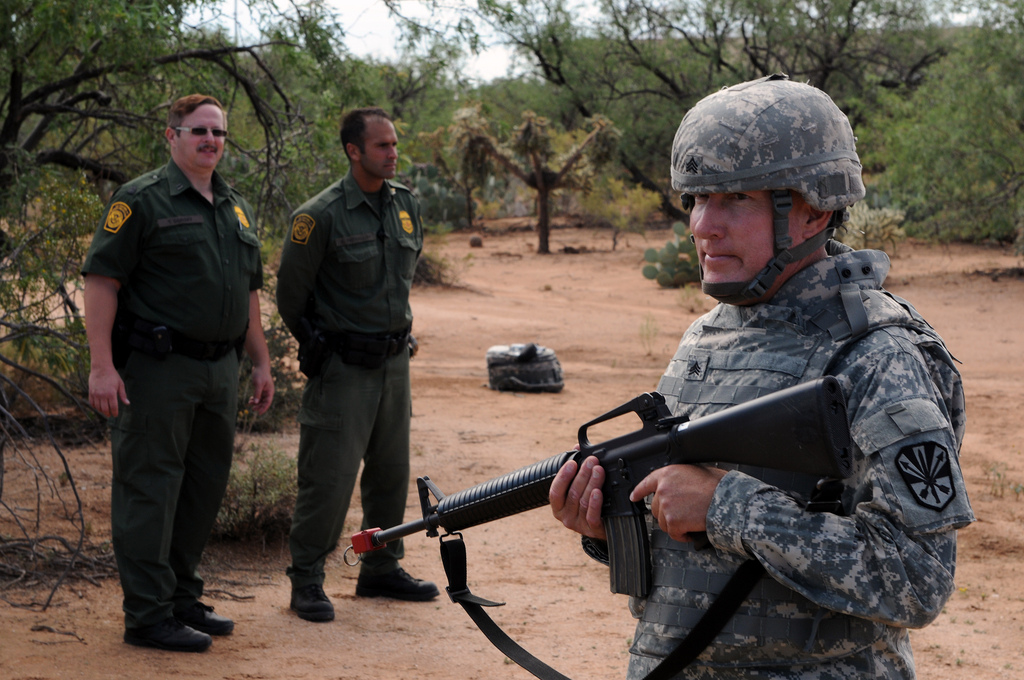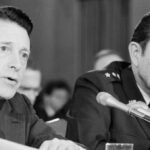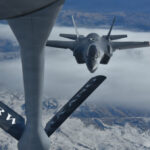
the problem at hand is one of enforcing laws rather than of imposing political aims by force.
We thank everyone who submitted responses for our second Whiteboard! Below (in no particular order) were the best responses to the following question.
What roles, if any, should the military have in policing the U.S. border?
1. Lieutenant Colonel Robert Mihara, Army Strategist, U.S. Army North (Fifth Army)
Some treatments of the role military forces should play in securing US borders fail to square with the fundamental problems that will naturally arise. As a consequence, such arguments are lost in tactical considerations of the moment or in familiar hypotheticals. American borders exist within a stable political context in which alliances and strong institutional partnerships undergird treaties and formal exchanges that enrich the US through efficient supply chains, access to larger markets, etc. The political-economic context of North America is too complex for any solution narrowly focusing on the border. Using the military will not solve the problem.
Militaries are for war. It is true that the US military has been constructively used to bolster law enforcement along its border regions, but those instances should not lead Americans to reflexively embrace permanent US military roles in border security missions. Given the present geopolitical context, the problem at hand is one of enforcing laws rather than of imposing political aims by force.
Some might point to the sophistication and capabilities of non-state actors trafficking illicitly in goods and persons across US borders, menacing and murdering those who impede them, to suggest that the military is necessary or desirable for border security. However, violent capacity and intent do not themselves constitute a war. Any given American city’s gang activity does not casually justify the abrogation of the US constitution or imposition of martial law. Likewise, the trafficking of narcotics and unregistered migrants does not themselves manifest a state of war.
Problem framing matters because militarizing border security can have deleterious consequences for military institutions and policy discourse. Militarizing what is fundamentally a governance and policing problem would absorb scarce military capacity and encourage policymakers to fixate on the symptoms of illicit activity over its root causes and mistake the satisfaction of activity for the resolution of genuine solutions.
2. Dr. George Schwartz, Immaculata University
The roles of the military for a mission to police the U.S. border are well defined. Title 10 of the United States Code provides a broad intent for the Army which includes preserving security, supporting national policies, and implementing national objectives. As with other land operations, operating in the homeland still includes the simultaneous application of the Army’s core competencies–decisive action and wide area security. In particular, wide area security uses elements of combat power to protect populations and to control terrain. Army doctrine, as defined in ADRP 3-28 Defense Support of Civil Authorities, lists a variety of tasks that units perform in support of border security, including surveillance, training and engineer support.
The National Guardsmen deployed on the current mission are performing these tasks, as did their predecessors on Operation Jump Start (2006-2008) and Operation Phalanx (2010-2016). But the primary role of military on the border is undoubtedly that of presence. For those considering crossing the border illegally, an increase in border protection, particularly when American service members are policing the border, must have some deterrent effect. For American citizens, however, the presence of the military sends a strong political signal demonstrating the administration’s commitment to protecting the homeland.
Regardless of what roles the military performs while policing the border, the administration has two important fiduciary responsibilities. The first is ensuring that the military is used effectively. In addition to freeing up CBP agents for patrols, a majority of the mission assignments should take advantage of the military’s unique capabilities while providing some training value, and not be tasks that should be performed through a service contract. The second is recognizing when the crisis is over and military augmentation is no longer necessary. The continuing lack of a comprehensive border security strategy, however, only increases the risk of mission creep.
the presence of the military sends a strong political signal demonstrating the administration’s commitment to protecting the homeland.
3. Mr. Eugenio Mendoza, Mexican Citizen
A natural duty of militaries is to secure the borders of their nations. But, it is important to examine why the question of “should” the military secure the border is being raised? Asking the question presumes there is an ethical concern left unaddressed.
In short, just because one can use the military does not necessarily mean one should, especially if it is because civilian law enforcement and the political leadership are ineffective or there are significant social problems left unaddressed. The military should not be used to overcome others’ shortcomings. Yes, the border must be protected, but address everything else at the same time! For example, using the military to stem the flow of drugs without addressing the demand for drugs within the U.S. makes no sense. Many of the U.S.’s border concerns are like this – caused by problems within the country.
An objective analysis to justify such an operation is needed – there is too much emotion involved right now. There are two key threats: the drug cartels who are a major source of crime and terrorism, and pervasive poverty that forces people to move where they can be safe. America is seen by the drug lords as very profitable, while the impoverished see American as their only hope. Neither group is going to be deterred by a wall – the drug lords already have passports and visas while the latter are too desperate not to try crossing.
This border conflict is mainly a conflict of societal integration in America. Military participation on the border may make some feel good, but it cannot fully substitute as law enforcement without forsaking its mission and values as a defense force. America may be a blend of the best of cultures, but civil-military cooperation in the U.S. seems so difficult. Why is that?
If the U.S. must use the military on the border, so be it. But if it is not supported with other actions at the national level to stop demands for drugs and lift people out of poverty, nothing will change.
4. Dr. Michael J. Piellusch, Adjunct Professor at Argosy University
The question is not so much “should we” but “how can we do it better.” Let me offer an example. In May 2006, then President George W. Bush sparked Operation Jump Start (OJS), which is an excellent example of border augmentation by the military. I participated in OJS and observed activities on the border during an early rotation in Yuma, Arizona.
President Bush called for 6,000 Guardsmen; 51 States and Territories in the National Guard, Army and Air, rallied to the call and signed up for the operation. Two areas where augmentation proved very beneficial were in fence construction and “electronic fence” surveillance. Building attractive and very tall fences positioned at strategic pinch points quickly helped stem the flow of illegal immigrants. Some of these pinch points were the subject of a pre-2006 video showing immigrants sprinting across the border.
The “electronic fence” was a video surveillance process where Guardsmen and Border Patrol Agents would sit side by side and work together. Interest in these two activities fed a rotating process that cumulatively exceeded the 6,000 soldier target set by President Bush. Moreover, cadre of durational Soldiers preserved continuity, lessons learned, and organizational memory. Issues were not absent, but they were overshadowed by performance.
Unfortunately, OJS did not last long. Governor Arnold Schwarzenegger refused to let the California Guard participate (one of only three States that did not participate). Debates about posse comitatus, language proficiency, “shoot, don’t shoot” (judgmental shooting) swirled about. However, OJS was a model exercise that successfully integrated military and law enforcement in a low-key operation. But future operations may not be low-key. On a mixed note, dignitaries such as senators, governors, generals, and journalists required OJS participants to conduct an almost daily routine of VIP tours. The troops loved the recognition, but sometimes the circus atmosphere of presenting improved “border order” was a bit distracting. Still, if the military must secure the border, OJS provides a lot of lessons in how to do it right.
The views expressed in this Whiteboard are those of the contributors and do not necessarily reflect those of the U.S. Army War College, U.S. Army, or Department of Defense.
Photo: Border Patrol agents observe an unnamed Arizona National Guard soldier training for Operation Copper Cactus on Aug. 25, 2010. Operation Copper Condor is the Arizona National Guard’s contribution to the up to 1,200 National Guard troops being deployed to support the Border Patrol and Immigration and Customs Enforcement in four Southwest border states.
Photo Credit: U.S. Army Photo by Staff Sgt. Jim Greenhill, public domain
Other Releases in the Whiteboard series:
- THE ADMINISTRATION’S TOP FOREIGN POLICY PRIORITY (A WHITEBOARD)
- AFTER 2020, WHAT’S NEXT? (A WHITEBOARD)
- IMAGINING OVERMATCH: CRITICAL DOMAINS IN THE NEXT WAR (A WHITEBOARD)
- THAT ONE MOST IMPORTANT THING: (A WHITEBOARD)
- SHALL WE PLAY A GAME?
(WARGAMING ROOM) - WAR(GAMING) WHAT IS IT GOOD FOR? (A WHITEBOARD)
- LEADERSHIP ROLE MODELS IN FICTION REVISITED: (A WHITEBOARD)
- WHAT GOOD IS GRAND STRATEGY? (A WHITEBOARD)
- THE UNITED NATIONS’ GREATEST ACCOMPLISHMENT: (A WHITEBOARD)
- LEADERSHIP ROLE MODELS IN FICTION: (A WHITEBOARD)





Anyone saying militaries aren’t for securing and defending their borders is an absolute ignorant NWO slave.
Why would any king or government allow invaders to penetrate into their territories instead of fighting them at the border… or better yet marching into the enemy’s territory and fighting them there so that any damage is suffered by the enemy and possibly allowing the annexation of the enemy’s territory when their force surrender, retreat, or are killed?
Also, anyone saying we shouldn’t use our military to secure our borders is antiWhite. It seems our militaries only exist to serve Israel and promote LGBT pedo prepping social demons.
Jason Kohne of No White Guilt
#NoWhiteGuilt
Well lets drill right down to constitutional powers. The president’s job is to keep WE THE PEOPLE safe and secure in our homes if our borders are being violated by criminal gangs, violators of our laws ( illegal crossing of our borders is a crime against our laws and our citizens right to safety) if this safety and or security is threatened in any way ir form he MUST act to provide that safety by any means at his disposal to achieve this end. Securing our borders IS THE JOB OF OUR ARMED FORCES . IT IS THE SOLE REASON WE HAVE A MILITARY. Putting them on our border to stop outside forces from harming citizens with deadly drugs is a no brainer they are not being used against americans but against a foreign entity so totally legal